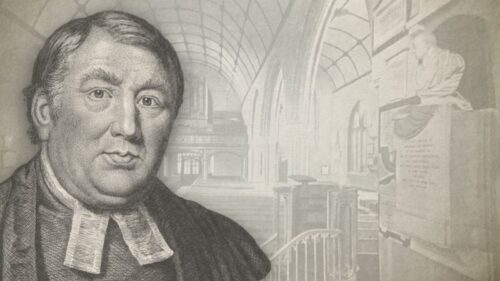
April 23—Morning Devotion
“For to this end Christ both died, and rose, and revived, that he might be Lord both of the dead and living.”—Romans 14:9
And was this the cause, dearest Jesus, of all thy sufferings, that thou mightest be the universal monarch on thine eternal throne? Then bend thy knee, my heart, and all the affections of my soul, and hail thy Jesus Lord of all! Now, Lord, I see through thy blessed teaching, though a fool, and slow in heart to believe all that the prophets have spoken—now I see how expedient it was that Christ should suffer, and should enter into his glory. Yes, thou art, indeed, Lord both of dead and living; the dead to raise, even the dead in trespasses and sins; and the living to live in them, and rule, and guide them. And as thou art Lord both of dead and living, so, precious Jesus, wilt thou be Lord over all the dead and lifeless affections of thy redeemed. Surely, Lord Jesus, my soul may well believe this; for if, when upon the cross, thou didst conquer death, now thou art upon the throne, every power must be put beneath thy feet. Shout then, my soul, .shout all ye followers of the Lord; never more let dead frames, or dying affections, or unbelief, or all the temptations of Satan, cast us down. Is not Christ upon the throne? And is he not Lord both of dead and living? And hath not this Almighty Lord, both of dead and living, power to save, power to quicken dead sinners, and comfort living saints; to give grace to the weak; and to them that have no might, to increase strength? Hath he not power to kindle anew his own graces that he first planted; to bring back again wanderers, to reclaim the long-lost backsliders, to soften hard hearts, to bind up broken hearts, to justify the guilty, to sanctify the filthy, to adopt orphans, to bless the fatherless, to be gracious, and kind, and merciful—in a word, to be Jesus? For in that one word is summoned up all. Oh blessed Master! Oh for an heart to love thee, to live to thee, to walk with thee, to rejoice in thee, to be always eyeing thee on thy throne; and never, never to lose sight of thee, my glorious, risen, and exalted Saviour, in this sweet and endearing point of view, in which thy servant the apostle hath here represented thee; that it was for this end, as well as a thousand other blessed purposes, that Christ both died, and rose, and revived, that he might be Lord both of dead and living. Hallelujah. Amen.
Robert Hawker (1753-1827) was an Anglican (High-Calvinist) preacher who served as Vicar of Charles Church, Plymouth. John Hazelton wrote of him:
“The prominent features…in Robert Hawker's testimony…was the Person of Christ….Dr. Hawker delighted to speak of his Lord as "My most glorious Christ.” What anxious heart but finds at times in the perusal of the doctor's writings a measure of relief, a softening, and a mellowing? an almost imperceptible yet secret and constraining power in leading out of self and off from the misery and bondage of the flesh into a contemplation of the Person and preciousness of Christ as "the chiefest among ten thousand and the altogether lovely." Christ and Him crucified was emphatically the burden of his song and the keynote of his ministry. He preached his last sermon in Charles Church on March 18th, 1827, and on April 6th he died, after being six years curate and forty-three years vicar of the parish. On the last day of his life he repeated a part of Ephesians 1, from the 6th to the 12th verses, and as he proceeded he enlarged on the verses, but dwelt more fully on these words: "To the praise of His glory Who first trusted in Christ." He paused and asked, "Who first trusted in Christ?" And then made this answer: "It was God the Father Who first trusted in Christ."
Robert Hawker on the Biblical Covenants (Complete)
Robert Hawker's Poor Man's Morning Portions





